Within the canals of England, we find our couple, Eva (Oona Chaplin) and Kat, (Natalia Tena) free spirited and fervent, living on a boat. They seem happy in their movable home, content in their relationship.
It’s lovely notion, but what if one of the women wants a child, and the other doesn’t? Can this create an unfixable wedge? Or does love conquer all?
Is It Enough?
In Anchor and Hope also known as Tierra Firme, one of the first introductions to these two are in the home of Eva’s mother, Germaine, played by Oona’s real-life mother, Geraldine Chaplin, mourning the loss of their cat. In Anchor and Hope she’s a bit eccentric, but their connection is real, even without knowing of their blood relation. Later she muses to our three leads, “it all seems so very complicated,” but isn’t it always?

It’s an emotional scene, setting up the crux of the film: parenthood. Eva seems a bit restless in their little corner of the world, and the emptiness she’s feeling centers on her desire for a child, especially now that their pet is gone. Kat, on the other hand, relishes their life as is. With the entry of a child they’d be forced to change their comfortable situation.
Not long after, Kat’s good friend Roger (David Verdaguer), a bit of a ladies man, visits. After many drinks, the idea of him becoming a donor comes to mind. While first disregarded, Kat eventually agrees, Roger too, thus beginning their journey to make a baby.
While the general idea, a couple wanting a baby but having split opinions on it, isn’t necessarily original, the setting is. Things don’t go as planned, and as the pair get closer to this notion becoming real, this awareness initially causes a rift between Kat and Eva.
There’s a very valid dramatic fiber beyond the comedic elements and the charm. Do you stick it out with someone you love if they don’t want the same things as you? Do you drop anchor and hope for them to change, or – as in this case – try to ignore their uncertainty?
The two eventually come to an impasse, and the passionate devastation is heartbreaking. Chaplin kills it. They each react in their own way, but Eva’s yearning for motherhood is especially moving.
Wonderful Portrayals In A Beautiful Landscape
The graceful Oona Chaplin pushes the material, balancing between the lighthearted antics within their carefree space, and the believable desire to be a mother. She’s mesmerizing. Natalia Tena, another Game of Thrones alum, is also a gifted actress. Her journey is a very different one, but nonetheless important or emotive. Together their romance feels authentic. There’s an ease for which these two interact that makes this seem like a real love story, and the three appear to have a lot of fun making the film, which comes through.
As Roger, David Verdaguer, he’s our comic relief. He manages to delight us with a different energy than our two-lead women, warmer and more affable, though by the end he surprises us with some tender moments as well.
How each of these characters changes throughout the process is part of what makes Anchor so innately relatable. There’s something you’ll find comparable in these individuals, and if not – you’ll feel empathetic and drawn to them. This is an interesting thing considering everything about their lifestyles is unique.
All three deliver very distinct emotional performances, and they all have chemistry. The vibrant Anchor and Hope feels wonderfully wild, but lived in, in large part because of the talented trio at the core. Some of the most memorable moments lie in the stillness of these characters, and with the ease in which the humor takes shape.
Written by Carlos Marques-Marcet and Jules Nurrish, it is a smart and funny meditation on a thirty-something couple within a turning point in life. While the film, at its almost two-hour runtime, has some periods that feel overly extended, it isn’t necessarily a deterrent. If anything, as we learn more about the couple in all of their flaws and fears, we’re able to understand their motives even more, and perhaps – tackle our own personal and relationship expectations.
Is there a balance that can be found between what you want and what the person you love wants? If it isn’t completely synonymous can it work? The baby isn’t the only paradigm they are left to work through here, making the stirring elements of Anchor become truly touching.
Director Carlos Marques-Marcet handles the narrative with maturity and lots of heart, making it all too easy to admire this story. There is also a terrific use of cinematography, providing a luscious environment, especially the beautiful opening sequence, and editing that matches the tone. Tim Dickel’s production design is also exceptional.
Conclusion: Anchor and Hope
Anchor and Hope, just as the title suggests, is about the decisions we make, and the dreams we sometimes give up. It’s a poignant tale encompassing love, parenthood, and the quest for harmony in an offbeat but naturalistic way. The cast shines, as do the gorgeous canal shots, making the film an emotional and visual feast.
What did you think? How did it compare to other romantic dramas? Let us know in the comments below!
Anchor and Hope will be released in the UK on September 28th and the US on November 18th. For more information on international release dates click here.
Does content like this matter to you?
Become a Member and support film journalism. Unlock access to all of Film Inquiry`s great articles. Join a community of like-minded readers who are passionate about cinema - get access to our private members Network, give back to independent filmmakers, and more.